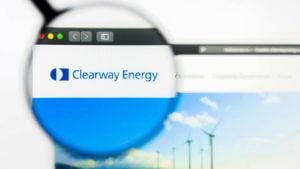While traditional energy sources, such as fossil fuels, will undoubtedly continue to play a significant role in the global energy mix, there is a clear and accelerating shift toward renewable energy. As the world’s energy demands continue to rise, it’s important to discuss the best renewable energy stocks to buy. That way, we can support the crucial players among renewable resources like solar, wind and hydropower.
Accordingly, this transition opens up a plethora of investment opportunities that you can capitalize on. This is especially true today, given that many promising companies within the renewable energy sphere have recently gone under the radar.
With August bringing notable market volatility, this could be an opportune moment to find value. In this article, I will highlight the three best renewable energy stocks that appear undervalued relative to their growth potential.
Brookfield Renewable Partners (BEP)

Emerging as a standout option in the renewable energy arena is Brookfield Renewable Partners (NYSE:BEP). This company is more than half owned by Brookfield Asset Management (NYSE:BAM), one of the world’s leading alternative asset managers. This relationship not only provides BEP with significant resources but also a competitive advantage in the energy sector.
The company has a proven track record of leveraging opportunities within renewable energy. It is continually expanding its diverse portfolio to include hydroelectric, wind, solar and energy storage assets. Importantly, BEP’s assets are underpinned by long-term contracts, often lasting decades, which offer a reliable and predictable revenue stream.
Despite the apparent disruption in 2020 due to a special BEPC share distribution, the company has consistently raised its payouts over the past decade. Today, BEP offers a rather attractive 5.8% dividend yield. Additionally, management is aiming for an annual cash distribution growth of 5% to 9% moving forward.
I believe that the combination of stable income and proven growth potential makes BEP a strong candidate for investors seeking the best renewable energy stocks.
Enphase Energy (ENPH)

Enphase Energy (NASDAQ:ENPH) doesn’t offer the stability and predictability seen in BEP’s long-term contracts. This company focuses on the development of microinverters and energy management systems designed for solar power installations. This is a wildly more dynamic and volatile segment of the renewable energy industry, making Enphase highly sensitive to the fluctuating demands of the solar energy market.
Further, contrary to BEP, Enphase Energy does not offer dividends, appealing more to growth-oriented investors rather than those seeking steady income. Despite the lack of dividends and inherent volatility, Enphase’s strong growth prospects and impressive margins form a compelling investment case.
In particular, the company has demonstrated remarkable growth in its history. It grew its revenues from a mere $20.2 million in 2009 to $2.29 billion last year. Moreover, Enphase generated $586.4 million in free cash flow out of this $2.29 billion, highlighting its high-margin business model and overall operating efficiencies.
Enphase’s growth has taken a dip this year, with revenues plunging by 57.3% in Q2, highlighting the industry’s cyclical nature. As mentioned earlier, the company remains profitable. Further, Wall Street expects a quick rebound in sales from FY2025 onwards.
Clearway Energy (CWEN)

Last but not least, let’s take a look at Clearway Energy (NYSE:CWEN). Clearway develops, owns and operates renewable energy assets, such as wind, solar and thermal generation facilities. Its diversified portfolio spans across the United States, giving it a strong foothold in the growing clean energy market domestically.
Similar to BEP, the company’s moat is built on its long-term power purchase agreements (PPAs). These ensure steady cash flows and provide financial stability during unfavorable market periods. Evidently, Clearway has proven it can effectively weather the underlying volatility of the renewable energy market and maintain consistent growth.
In particular, Clearway has experienced accelerated growth in recent years, with revenues rising from $1.03 billion in 2019 to $1.31 billion last year. The company is expected to see a slowdown in growth this year, with consensus estimates forecasting a muted 3.8% top-line rise. That said, growth is anticipated to pick up again from next year.
In the meantime, shares are trading at a reasonable valuation, forming an attractive option for investors seeking exposure to the renewable energy sector with a name offering a wide margin of safety and notable income prospects. At a forward EV/EBITDA of 12x and a dividend yield of 5.6%, I believe that Clearway satisfies both requirements.
On the date of publication, Nikolaos Sismanis did not hold (either directly or indirectly) any positions in the securities mentioned in this article. The opinions expressed in this article are those of the writer, subject to the InvestorPlace.com Publishing Guidelines.
On the date of publication, the responsible editor did not have (either directly or indirectly) any positions in the securities mentioned in this article.
Nikolaos Sismanis is a professional research analyst with five years of experience in the field of equity research and financial modeling. Nikolaos has authored over 1,000 stock-related articles that focus on uncovering deep value opportunities, identifying growth stocks at reasonable valuations, and shining a spotlight on overlooked international equities.








